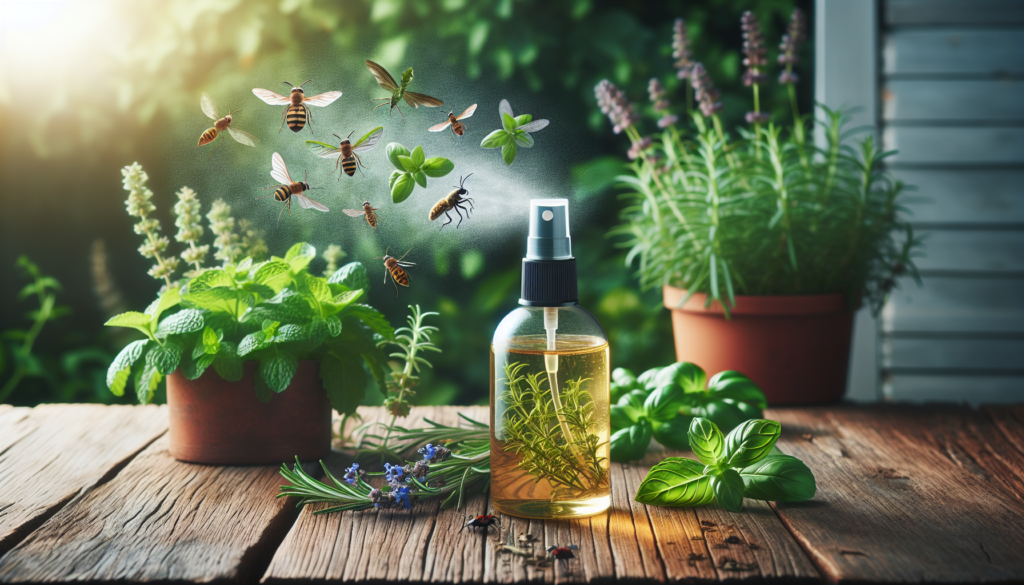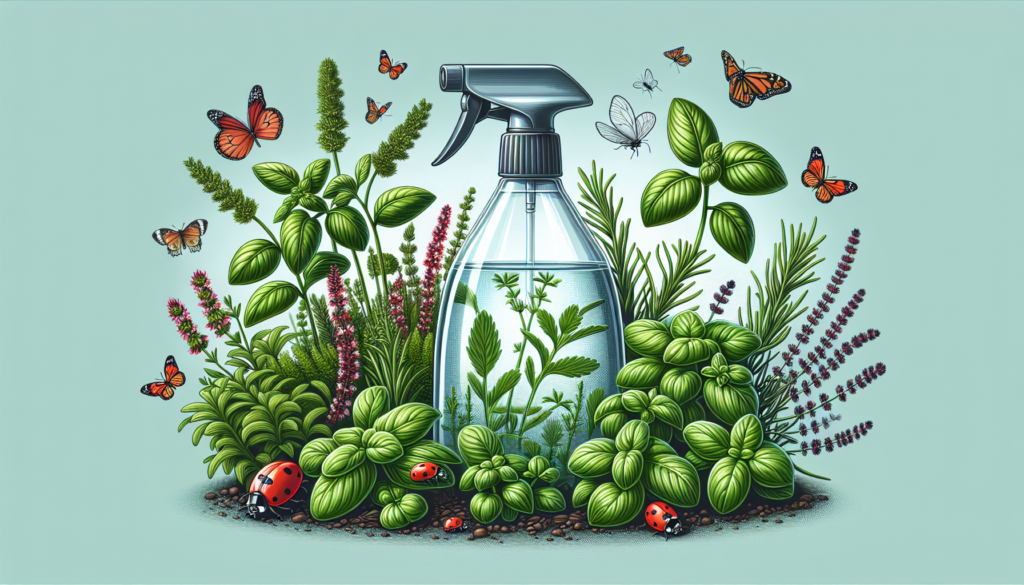If you’re an avid gardener or simply enjoy cooking with fresh herbs, you may have encountered the frustrating problem of insects wreaking havoc on your prized plants. But fear not, for there is a simple solution to this pesky issue. In this article, we will explore the various options available to keep bugs away from your herbs, allowing you to enjoy your flavorful harvest without any unwanted visitors. Whether you prefer natural remedies or commercially available sprays, with the right approach, you can maintain the health and beauty of your herbs while keeping those pesky bugs at bay.

Natural Bug Repellents for Herbs
As a herb lover and gardener, you want to keep your precious herbs safe from pesky bugs. Luckily, there are several natural bug repellents that can help protect your herbs without the use of harmful chemicals. In this article, we will explore different methods to repel bugs from your herbs, including essential oils, garlic spray, chili pepper spray, neem oil, and soap spray. Additionally, we will discuss other natural bug repellents such as marigold plants, basil plants, and petunias. By implementing these methods and incorporating regular inspection and maintenance into your herb garden routine, you can ensure that your herbs stay healthy and pest-free.
Essential Oils
Essential oils not only add delightful scents to our lives, but they can also be effective in repelling bugs from your herbs. Three essential oils that are particularly useful for this purpose are lavender oil, peppermint oil, and rosemary oil.
Lavender Oil
Lavender oil is not only known for its soothing properties, but also for its ability to repel various insects. To make a lavender oil spray, mix 10-15 drops of lavender essential oil with water in a spray bottle. Shake the bottle well and spray the mixture on and around your herbs. The sweet aroma of lavender will help keep unwanted bugs at bay.
Peppermint Oil
Peppermint oil is a refreshing and invigorating scent that insects find unappealing. Mix 10-15 drops of peppermint essential oil with water in a spray bottle and apply it to your herbs. The strong aroma of peppermint will help deter bugs from feasting on your herbs.
Rosemary Oil
Rosemary oil not only adds a savory flavor to your culinary creations but also acts as a natural bug repellent. Mix 10-15 drops of rosemary essential oil with water in a spray bottle and apply it to your herbs. The strong scent of rosemary will ward off unwanted insects, ensuring that your herbs remain unharmed.
Garlic Spray
Garlic, known for its pungent smell, can also be used as an effective bug repellent for your herbs. Creating a garlic spray is easy and can help protect your herbs from pests.
Recipe for Garlic Spray
To make a garlic spray, take two to three cloves of garlic and crush them. Combine the crushed garlic with two cups of water in a blender and blend until you have a smooth mixture. Strain the mixture to remove any chunks and pour the liquid into a spray bottle.
How to Apply Garlic Spray
To apply the garlic spray, generously spray it on your herbs, making sure to cover both the leaves and stems. The strong smell of garlic will act as a deterrent to bugs, keeping them away from your herbs. Remember to reapply the spray after rainfall or every week to maintain its effectiveness.
Chili Pepper Spray
If you’re looking for a spicy solution to keep bugs away from your herbs, look no further than chili pepper spray. The capsaicin in chili peppers is known to repel insects and can help protect your herbs from damage.
Recipe for Chili Pepper Spray
To make chili pepper spray, combine one tablespoon of dried chili flakes or one chopped fresh chili pepper with two cups of water. Bring the mixture to a boil and let it simmer for about 15 minutes. Allow the mixture to cool, then strain it to remove any solids. Transfer the liquid into a spray bottle.
How to Apply Chili Pepper Spray
Before applying chili pepper spray, it is advisable to test it on a small area of your herbs to ensure they do not have negative reactions. Once tested, spray the mixture generously on both the upper and lower surfaces of your herb leaves. The spicy nature of the spray will repel bugs, keeping your herbs safe and healthy. Remember to reapply the spray every few days or after rainfall to maintain its effectiveness.

Neem Oil
Neem oil, derived from the seeds of the neem tree, has been used for centuries as a natural remedy for various ailments. It is also an effective bug repellent for your herbs.
Benefits and Uses of Neem Oil
Neem oil contains compounds that repel insects and can inhibit their growth. It is non-toxic to humans and pets, making it a safe option for your herb garden. Neem oil can also help to control fungal diseases that may affect your herbs.
How to Use Neem Oil as a Bug Repellent
To use neem oil as a bug repellent, dilute it with water according to the instructions on the packaging. Transfer the diluted neem oil into a spray bottle and apply it to your herbs, covering all surfaces. This will create a protective barrier against insects, preventing them from harming your herbs. Repeat the application every two weeks or after rainfall to ensure continual protection.
Soap Spray
Soap spray is a simple and effective way to control and repel bugs from your herbs. It works by suffocating insects on contact, making it an ideal option for small infestations.
Recipe for Homemade Soap Spray
To make a homemade soap spray, mix one to two tablespoons of liquid dish soap with one quart of water in a spray bottle. Shake the mixture gently until it is well combined.
How to Use Soap Spray on Herbs
When applying soap spray to your herbs, make sure to cover all surfaces, including the undersides of leaves. This will ensure that all insects come into contact with the solution. Be careful not to oversaturate the leaves, as this may cause damage. Reapply the soap spray every few days or after heavy rain to fend off any persistent bugs.
Other Natural Bug Repellents
Aside from essential oils, garlic spray, chili pepper spray, and neem oil, there are other natural bug repellents that can help protect your herbs from unwanted pests. Marigold plants, basil plants, and petunias are particularly effective in repelling insects and can be grown alongside your herbs.
Marigold Plants
Marigolds are not only colorful additions to your garden but also act as natural insect repellents. The strong scent of marigold flowers deters pests, making them an excellent companion plant for your herbs.
Basil Plants
Basil is a versatile herb with a strong aroma that pests find unappealing. Planting basil alongside your other herbs can help repel insects and protect your entire herb garden.
Petunias
Petunias, with their beautiful blooms, can also serve as natural insect repellents. They emit a scent that repels pests, making them a lovely addition to your herb garden.
Marigold Plants
Marigold as a Natural Insect Repellent
Marigold plants contain compounds that repel insects and deter them from damaging your herbs. The strong scent of marigold flowers acts as a natural deterrent, warding off pests and protecting your herbs from harm.
Companion Planting with Marigold
To use marigold plants as a natural insect repellent, consider planting them alongside your herbs. The strong aroma of marigold flowers will help repel pests and create a protective barrier around your herbs. Remember to choose the appropriate marigold variety for your region and climate to ensure successful companion planting.
Basil Plants
Effectiveness of Basil as a Bug Repellent
Basil plants not only add flavor to your meals but also help protect your herbs from bugs. The strong scent of basil leaves acts as a natural insect repellent, keeping pests away from your herb garden.
Growing Basil for Pest Control
To maximize the effectiveness of basil as a bug repellent, plant it near your other herbs or strategically place potted basil plants throughout your herb garden. This will help deter insects and keep them from causing damage to your herbs. Regularly harvest and use the basil leaves to encourage healthy growth and ensure continuous protection against pests.
Regular Inspection and Maintenance
In addition to using natural bug repellents for your herbs, regular inspection and maintenance are crucial for a healthy and pest-free herb garden.
Identify Warning Signs
Regularly inspect your herbs for any signs of pests, such as chewed leaves, small holes, or discoloration. Identifying warning signs early on can help prevent an infestation from spreading and causing significant damage.
Remove Infested Leaves
If you notice any infested leaves or plants, promptly remove them from your garden. This will prevent pests from spreading and damaging other herbs in the vicinity.
Monitor for Pests
Keep a close eye on your herbs and regularly monitor them for any signs of pests. Regularly checking for pests will allow you to take immediate action, such as applying natural bug repellents or other pest control methods, to keep your herbs safe.
In conclusion, keeping bugs away from your herbs can be accomplished through the use of various natural bug repellents. Essential oils, garlic spray, chili pepper spray, neem oil, and soap spray are effective and eco-friendly options that can help preserve the health and vitality of your herb garden. Additionally, incorporating other natural bug repellents such as marigold plants, basil plants, and petunias can provide added protection for your herbs. By regularly inspecting and maintaining your herbs, you can stay one step ahead of pests and ensure that your herb garden thrives. So, spritz, spray, and plant with confidence, knowing that you have natural bug repellents on your side to keep your herbs safe and bug-free!





